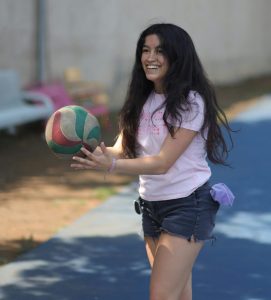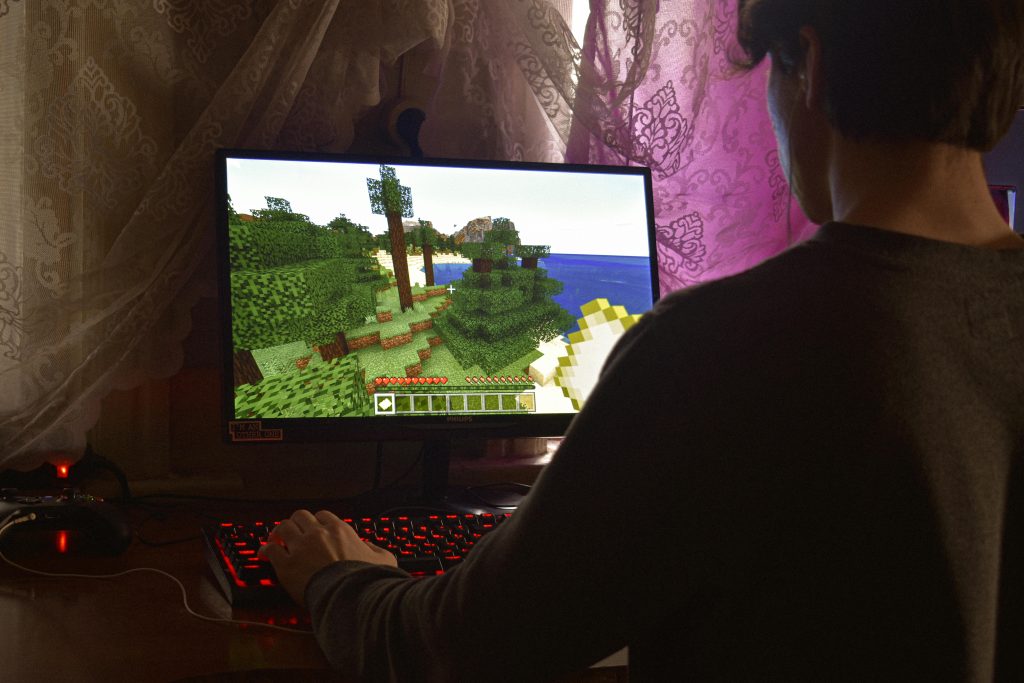3.1 Meine Freizeitaktivitäten

Lektionsüberblick
By second year German, you should be able to state what your hobbies and other free time activities are. As you become more proficient in German, it is helpful to be able to say more about your hobbies and your future free time plans – that is the focus of this lesson. In the end, you will be able to talk about 1) your free time activities, 2) your free time in the virtual world, 3) your weekend, spring break, and other future plans, and 4) what your free time would look like, if time and/or money were unlimited.
1) Meine Freizeitaktivitäten
The following thematic overviews should be, at least in part, a review. New will likely be how to talk about these things in the future. As you listen to and read the many phrases on hobbies and other free time activities, pay special attention to – and take note of! – the phrases that are meaningful to you. Those are the words you should work on committing to memory.
Kreative Hobbys
Sportarten
Andere Spiele und Aktivitäten
Listen and read as the students describe how long they have been doing their hobby and why they stick with it.
 |
 |
 |
| Seit drei Jahren spiele ich Volleyball. Es ist mein Lieblingsport, weil es mir Spaß macht, mich zu bewegen, und weil ich gut spielen kann. Ich habe auch viele gute Freunde in der Mannschaft. | Ich bin sehr musikalisch. Ich spiele Klavier seit zehn Jahren! Als kleines Kind habe ich angefangen. Außerdem singe ich Sopran im Frauenchor. | Ich spiele gern Call of Duty, weil ich Strategien haben muss und schnell reagieren muss, um zu gewinnen. Seit zwei oder drei Jahren spiele ich mit einer Gruppe von Online-Freunden. |
Let’s practice.
Jetzt bist du dran!
Welche Aktivitäten sind am wichstigsten in deinem Leben? Wie lange machst du dein Lieblingshobby? Warum gefällt dir dieses Hobby? Write your answers down in your written journal. Later in this lesson, we will explore which hobbies you might do in the future.
2) Freizeit in der virtuellen Welt
For many people, the online world is an engaging and rewarding place to spend free time. Let’s delve into some activities, expressions, and terminology that might help you express yourself, wenn du viel Zeit in der virtuellen Welt verbringst.
Zocken und andere Spiele und Aktivitäten
Let’s expand on these ideas. Read and listen to the students describe the activities they do in the online world.
 |
 |
 |
| Ich verbringe viel Zeit auf TikTok. Ich schaue oft ASMR-Videos, um mich zu entspannen, oder GRWM-Clips, die mir neue Styling-Ideen geben. Manchmal mache ich bei Challenges mit, zum Beispiel bei Tanz- oder Trend-Videos. Es gibt viele Creator*innen, die lustige, spannende oder nützliche Inhalte posten. So ist TikTok für mich nicht nur Unterhaltung, sondern auch eine Quelle für neue Ideen und Inspiration. | In Minecraft crafte ich gerne Welten und erkunde verschiedene Biome. Manchmal spiele ich im Survival-Modus, sammle Ressourcen und kämpfe gegen Creeper oder im Nether. Wenn ich mit Freund*innen spiele, craften wir zusammen große Projekte oder spielen Minigames auf Servern. Ich teste auch gerne neue Mods und Texture Packs. Minecraft ist für mich eine tolle Mischung aus Kreativität, Abenteuer und Spaß mit anderen.
|
SnapChat ist ein wichtiger Teil meines Alltags. Auf Snapchat schreibe ich meinen Freund*innen und teile meinen Alltag in Snaps mit. Ich benutze lustige Filter, poste Stories und halte meine „Streaks“ am Laufen. Außerdem schaue ich mir virale Spotlight-Videos an. So bleibe ich schnell und einfach mit anderen in Kontakt.
|
Kleiner Hinweis
In many German online communities, popular English abbreviations (die Kürzel) have been eingedeutscht, meaning that they use English abbreviations and terms, but pronounce them in German, adding endings to fit German grammar.
- BTW (e.g. “Cooles Profilbild BTW” )
- OMG (e.g. “OMG, der Film war so cool!” ) Note: Here Oh my God, and Oh mein Gott match in terms of acronym formation.
- Craft (e.g. “Ich crafte ein Haus.” )
Interested in this type of language intermingling? You can read…
- Die 10 coolsten Kürzel für Snapchat
- Do you speak Tiktok? Die wichtigsten TikTok-Begrifee kurz erklärt
- 50 wichtige Spielbegriffe, die jeder Gamer kennen sollte
Note: These articles are written in German, but the key terms are in list form so you can try reading for gist or simply skim to see the terms.
Jetzt bist du dran!
Now, let’s make this real by engaging with authentic German language content on your favorite social media app. You’ll find a German influencer in your area of interest, observe the language they and their followers use, and analyze popular online expressions.
Instructions:
- Find a German Influencer
- Open your favorite social media platform (Instagram, TikTok, YouTube, Twitter/X, etc.).
- Think about a hobby or topic you enjoy (e.g., gaming, fashion, fitness, photography, science, travel).
- In the search bar, try using German keywords related to your interest. For example:
- If you like cooking, search for “deutsche Rezepte” or “Foodblogger Deutschland.”
- If you like fitness, search “Fitness Deutschland” or “deutscher Fitnesscoach.”
- If you like technology, search “Technikblogger Deutschland” or “Tech Influencer DE.”
- Choose a German-speaking influencer whose content interests you.
- Observe & Take Notes
- Watch or read a few of their posts.
- Pay attention to how they speak/write and any informal phrases they use.
- Read the comments! Look for slang, abbreviations, or trending expressions.
- Identify Common or New Terms
- Write down at least five terms or expressions from the influencer or the comments.
- If possible, try to figure out what they mean based on context.
- Examples of common online expressions in English include: LOL, OMG, IDK, etc. What expressions do you see/hear in German?
- Write a Short Reflection (50-100 words)
- Briefly introduce the influencer you found (name, topic, why you chose them).
- Share the five terms or phrases you discovered and explain what they mean.
- Reflect: Did you notice similarities to English? Any words that surprised you? How do Germans interact online compared to what you’re used to?
3) Meine zukünftige Freizeitaktivitäten
Let’s think of your plans for the future (e.g. this weekend, Spring Break, etc.). What free-time activities do you see yourself doing? Read as Annika, Aeman, and Claudia talk about their future activities.
 |
 |
 |
| Während der Frühlingsferien werde ich die Zeit nutzen, um die Natur in Liechtenstein zu genießen. Ich werde in den Bergen wandern oder einen Ausflug an den Walensee machen. Abends werde ich mich mit Freunden treffen oder an Uni-Projekten weiterarbeiten. | Am Samstag hat meine Freundin Geburtstag, und ich werde ihr ein besonderes türkisches Gericht kochen. Zum Nachtisch werde ich einen Schokoladenkuchen backen. Ich freue mich darauf. | Ich habe diesen Sommer frei! Endlich kann ich meine Lieblingsaktivitäten machen! Ich werde viele Musikfestivals mit meinen Freund*innen besuchen und werde ich auch Zeit mit meinem Freund verbringen. Wir gehen gern ins Kino. |
Let’s practice.
Jetzt bist du dran!
Was machst du am Wochenende? Was wirst du in den Frühlingsferien machen? Was hast du im Sommer vor? Answer the questions in your written journal, using the modeled language above. Be sure to check your writing!
Then record yourself in your audio journal.
4) Meine Traumfreizeitaktivitäten
If you had all of the time and money in the world, what would you do in your free time? Would you volunteer at the animal shelter, play video games 24/7, or start your own band? Was würdest du tun? (tun = to do). Lese bitte Sandors Antwort.
 |
Wenn ich endlos viel Zeit und Geld hätte, wäre mein Leben ganz anders. Ich würde nach Neuseeland und Australien reisen und dort vielleicht eine Weile leben. Ich würde in der Natur wandern und neue Freunde kennenlernen. |
Kleiner Hinweis
There are two words for “to do” in German : machen and tun. Sometimes they are interchangeable but not always. Machen is more often used for actions that result in more tangible items like doing your homework or doing arts and crafts.
- Heute abend werde ich meine Hausaufgaben machen.
- Ich werde eine Handarbeit machen.
Tun is more general and unspecific.
- Ich weiß nicht, was ich tun soll.
- Ich tue das nur, weil es mein Job ist.
Jetzt bist du dran!
Imagine you are hanging out with your German-speaking friends playing a game of “What would you do…?” The question is, Was würdest du machen, wenn du endlos viel Zeit und Geld hättest? How would you fill your life?
Wenn ich endlos viel Zeit und Geld hätte, wäre ich…
Wenn ich endlos viel Zeit und Geld hätte, hätte ich…
Wenn ich endlos viel Zeit und Geld hätte, würde ich…[machen].
Write your answers in complete sentences in your written journal. Then record yourself in your audio journal.
Jetzt kombinieren!
- In meiner Freizeit bin ich relativ kreativ. Ich mache viele Handarbeiten wie gehäkelte Mützen und Schals.
- Ich verbringe auch etwas Zeit auf TikTok. Ich schaue Videos, um mich zu entspannen und neue Ideen zu entdecken.
- In der Zukunft werde ich eine Sprache lernen oder ein Instrument spielen. Musik und Sprachen sind kreative Aktivitäten, die ich noch nicht ausprobiert (=try) habe.
- Wenn ich endlos viel Zeit und Geld hätte, würde ich mich ehrenamtlich für eine Hilfsorganization engagieren.

Media Attributions
- 2030-2040 fl banner large is licensed under a CC BY-NC-SA (Attribution NonCommercial ShareAlike) license
- pexels-ludodelot-17143322
- pexels-cottonbro-7519066
- pexels-a-darmel-7862612
- pexels-cottonbro-4046303
- pexels-alscre-3977908
- Photo of Aemen by Photo by Kampus Production: https://www.pexels.com/photo/confident-black-man-in-formal-outfit-in-library-5940858/
- Photo from Pexels by Photo by Stefan Stefancik: https://www.pexels.com/photo/man-on-gray-shirt-portrait-91227/

